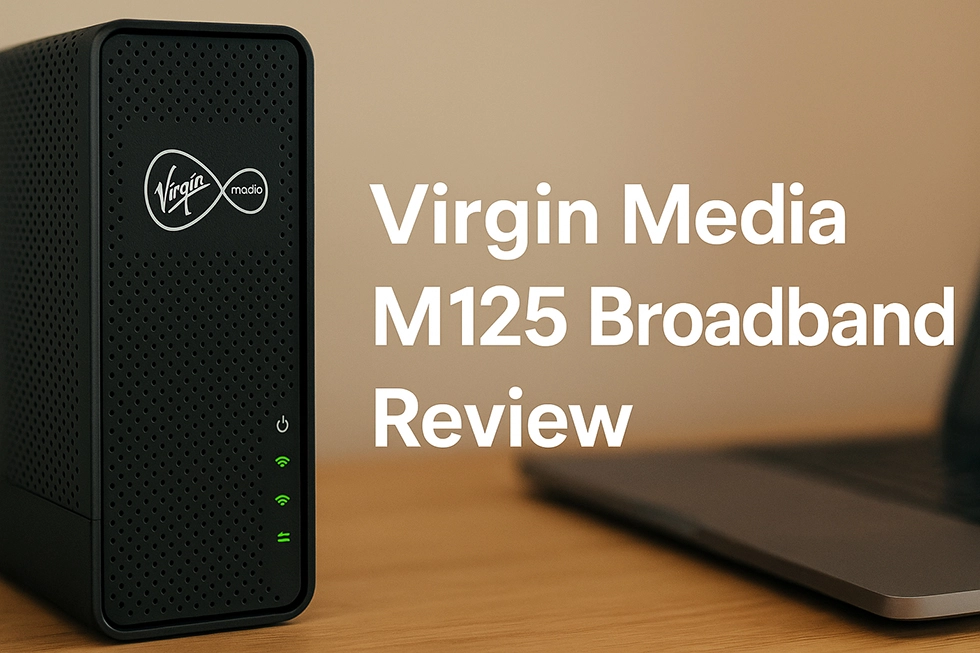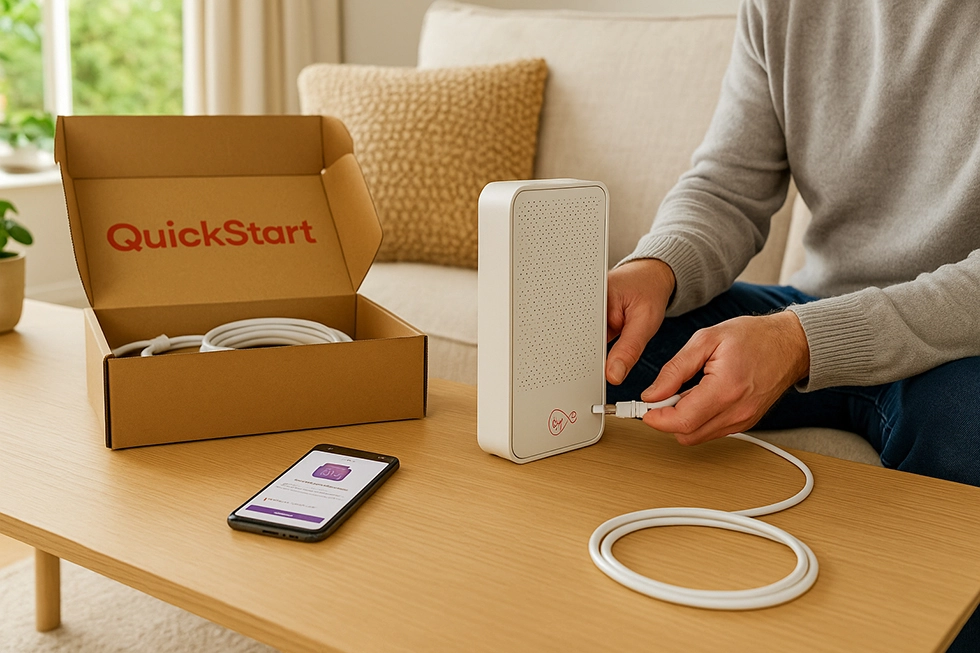Virgin Media M125 Broadband Review

Virgin Media M125 is a simple, entry-level fibre broadband plan with fast downloads and slower upload speeds.
It comes with a 132Mbps average download speed and 20Mbps upload speed, and it’s great for day-to-day use — streaming, browsing, downloading, and working from home — without paying for speeds you don’t need.
Virgin Media M125 plan details
Today’s Offers
| Plan | Speed | Price | |
|---|---|---|---|
 M125 Fibre M125 Fibre24 month contract |
132Mb avg |
£23.99 / month £287.88 / year More details |
 |
| Free Setup. Voucher offer ends 22nd January. | |||
 M125 + Phone M125 + Phone24 month contract |
132Mb avg |
£31.99 / month £383.88 / year More details |
|
| Free Setup. Includes Anytime calls to UK landline and mobiles. | |||
 M125 + Flex TV M125 + Flex TV24 month contract |
132Mb avg |
£29.99 / month £369.88 / year More details |
|
| Free Setup. Flex TV includes Stream box, 150+ TV channels and 1 month rolling contract. |
Virgin Media M125 broadband speeds
Download speed (132Mbps)
Virgin Media M125 offers fast download speed — 132Mbps on average — which is ideal for streaming shows, downloading apps, and working from home. It handles the basics and more, even in larger households with lots of connected devices.
Here’s how long common downloads take with a 132Mbps connection:
- 10GB file: 10 minutes
- 25GB 4K film: 26 minutes
- 50GB game update: 52 minutes
- 100MB music album: 6 seconds
Virgin Media download time comparison
Upload speed (20Mbps)
M125’s 20Mbps upload speed is significantly slow, and often considered sluggish when other providers offer faster or symmetrical upload speeds (equal to the download speed). It’s fine for casual use, but if you upload large files or rely on cloud-based tools, you may find it insufficient for your tasks.
At 20Mbps upload speed, these are the typical upload times:
- 1GB file: 7 minutes
- 2GB folder of photos: 14 minutes
- 5GB video file: 34 minutes
Virgin Media upload time comparison
Latency (10–20ms)
Low latency is an additional factor that improves fast broadband. The lower the latency, the better the internet experience — especially when gaming online, video calling, or using interactive apps. It measures the response time of your connection (also known as ping), not the download speed.
On Virgin Media’s cable network, latency typically sits between 10–20ms. That’s low enough for smooth multiplayer gaming, real-time voice chat, and high-quality video calls without lag or delay.
While Virgin Media offers decent latency, some providers offer lower ping times. Take a look at the comparison:
- Virgin Media: 10–20ms
- Virgin Media (cable): 15.2–16.1ms
- BT full fibre: 6.4–6.9ms
- Community Fibre: 2ms
- Hyperoptic: 1–3ms
Virgin Media M125 broadband deals
M125 is available in different Virgin Media packages. While the speed stays the same, the extras — like phone or TV — vary between them.
Virgin Media M125 broadband only
A standalone broadband package with no phone or TV bundle.
Includes:
- M125 broadband
- Virgin Media Hub (model varies by stock)
- WiFi Max available as an add-on for extra coverage
Best for: homes that don’t need a landline or pay TV service.t use mobiles for calls and rely on streaming apps for TV.
Virgin Media M125 broadband + phone
This option includes broadband along with a digital home phone service delivered over your internet connection.
What’s included:
- M125 broadband
- Virgin Phone service
- Anytime Chatter (includes calls to UK landlines and mobiles)
Suitable for: households that still use a home phone for regular UK calls.K calls.
Virgin Media M125 broadband + Flex TV
This flexible TV bundle includes Virgin’s Stream box, which brings together live TV and streaming apps, all without a long TV contract.
What’s included:
- M125 broadband
- Stream (Flex) box
- 150+ channels, plus built-in streaming apps and catch-up services
- Optional monthly extras like Sky Sports or premium channels
Good for: households that stream a lot but still want easy access to live TV. TV and apps through one box, without locking into a big TV contract.
Virgin Media M125 broadband + TV bundles
These bundles combine M125 broadband with Virgin’s full-featured TV packages on a 24-month contract.
What’s included:
- M125 broadband
- TV box
- 190 - 230+ channels
- Netflix Standard with ads included
Ideal for: households that want a complete broadband and TV setup with traditional channels and streaming in one place. that want premium tv channels alongside broadband, with Netflix included in the TV bundle.
Volt bundles (M125 + O2 SIM)
Virgin Media and O2 customers can combine their services into a Volt bundle, unlocking extra features across both broadband and mobile.
Key Volt extras often include:
- A boost to your broadband speed, upgrading M125 to M250
- WiFi Max included, for wider coverage and more consistent speeds
- Double mobile data on qualifying O2 Pay Monthly plans
Volt bundles are available to both new and existing customers, depending on eligibility and the specific plan chosen.
Virgin Media M125 Student Broadband
Students can get M125 broadband on a shorter contract, perfect for term-time stays. It offers fast download speeds without tying you into a long agreement.
What’s included:
- Average download speed of 132Mbps
- Short-term contract (often 12 months)
- Virgin Media Hub router (
- Optional WiFi Max pods if your Wi-Fi needs a boost
Ideal for:
- Streaming lectures and shows
- Online research, browsing, and coursework
- Shared student flats with multiple connected devices
It’s a great no-fuss option for students who want fast internet without paying for extra speed they won’t use.
Virgin Media Hub Router and WiFi Max
Virgin Media offers several router models with the M125 plan, depending on the package and stock in your area. The most common Hubs are Hub 3, Hub 4, and Hub 5, each offering different levels of performance.
Hub 5
The latest and most advanced router. It supports Wi-Fi 6, which delivers faster speeds, better performance in busy homes, and improved efficiency across multiple devices.
- Wi-Fi: Wi-Fi 6
- Bands: 2.4GHz and 5GHz
- Ethernet: 1 × 2.5Gb, 3 × 1Gb
- Ideal for: modern households with lots of newer tech and heavy Wi-Fi use
Hub 4
A good mid-range option. It runs on Wi-Fi 5 and is capable of handling everyday online activity.
- Wi-Fi: Wi-Fi 5
- Bands: 2.4GHz and 5GHz
- Ethernet: 4 × 1Gb
- Ideal for: typical homes with a mix of wired and wireless devices
Hub 3 (Wi-Fi 5)
The oldest of the three. While reliable, it can show its age in busier households or in properties with poor Wi-Fi coverage.
- Wi-Fi: Wi-Fi 5
- Bands: 2.4GHz and 5GHz
- Ethernet: 4 × 1Gb
- Ideal for: smaller homes or users with fewer connected devices
WiFi Max
Virgin’s WiFi Max is a useful add-on for households that struggle with patchy Wi-Fi coverage. It uses mesh pods to boost signal strength across your home, especially in places where thick walls or layout reduce Wi-Fi performance.
After setup, Virgin guarantees at least 30Mbps in every room. If that target isn’t met, they offer a credit towards your bill (terms apply).
Already have a third-party router or mesh kit? No problem. Just switch the Hub into modem mode and connect your preferred equipment directly.
Is Virgin Media M125 any good?
M125 is a reliable option if you want fast downloads without paying for speeds you don’t need. It’s ideal for small households that use internet for everyday use, browsing, streaming and working from home — but not ideal for upload-heavy tasks.
Pros
- Delivers 132Mbps download speed, which is plenty for Netflix, YouTube, Zoom calls and online gaming
- It's affordable plan when compared to faster Virgin packages M500 or Gig1.
- Offers flexibility with broadband-only, broadband + phone, or bundles that include Flex TV or full TV services
- WiFi Max is available for households with wi-fi issues.
Cons
- 20Mbps upload speed is slower than many full fibre plans and may frustrate those who upload large files or run cloud backups often
- Latency is usually acceptable for most use cases, but some gamers or remote workers may prefer the snappier performance of full fibre.
- Not all Hubs perform equally — the Hub 5 is better for Wi-Fi reliability than the older Hub 3
- 24 month contracts and yearly price hikes are standard
Summary
If you want a low cost broadband plan for watching, downloading, and browsing, M125 ticks the boxes. But if upload speed, low latency or faster fibre speeds are priorities, look at full fibre deals or faster Virgin options like M250 or M350..
Alternatives to Virgin Media M125
- Plusnet Full Fibre 145
- Vodafone Full Fibre 150
- Sky Full Fibre 150
- Hyperoptic Fibre 150
- Community Fibre 150Mbps
FAQ
Is 20Mbps upload speed of M125 enough for gaming?
For online gaming itself, yes. Most multiplayer games use very little upload bandwidth. What matters more is latency and whether your connection stays consistent.
20Mbps upload speed starts to feel limited when you do gaming-adjacent tasks at the same time, such as:
- live streaming gameplay
- uploading clips in the background
- two people doing cloud backups while someone games
That said, if you play on Wi-Fi, the biggest win is often reducing Wi-Fi delay: keep the Hub closer to the console/PC, use 5GHz, or plug in Ethernet for more consistent ping.
Is M125 the right plan for me?
M125 is suitable for homes that want fast everyday downloads without paying for an ultrafast package. With 132Mbps download speed, it covers HD and 4K streaming, app downloads, browsing, and video calls for most typical households.
How many devices/people? As a practical guide, M125 is usually fine for:
- 1–3 active users doing mixed use at the same time
- a typical home full of connected kit (phones, laptops, a couple of TVs, a console, smart speakers)
If your home regularly does “big downloads while everyone else is streaming”, M250 is the better option. It doubles the average download speed to 264Mbps and adds a small bump to upload speed (25Mbps). The upgrade shows up most clearly on large files: for example, a 50GB game update can take 52 minutes on M125 and 26 minutes on M250 (based on the download-time table you’re using).
What is M125 with Flex TV?
M125 with Flex TV combines broadband with Virgin’s Stream/Flex box and a rolling 30-day TV service.
Flex focuses on:
- live TV channels (Virgin quotes 150+ channels for Flex)
- catch-up and streaming apps in one place
- optional add-ons you can switch on and off month to month (for example, sports/cinema packs, and Netflix if you choose to add it)
It’s built for people who want live TV plus apps through one box, without committing to a long TV contract.
What’s the difference between M125 broadband only and M125 + phone?
M125 broadband only gives you the broadband service and the Hub. M125 + phone adds Virgin’s digital home phone service, which runs through the broadband connection.
The main differences you’ll notice:
- M125 + phone costs more per month than broadband only (the exact difference depends on the deal and any discounts)
- the phone service uses the Hub (Virgin supplies the adapter you need for a standard handset)
- phone bundles include a calling plan, commonly Anytime Chatter, rather than you paying per minute for normal UK calls
If nobody uses a landline, broadband only keeps things simpler. If you still want a home phone for family calls, M125 + phone is the cleaner option than relying on pay-as-you-go call charges.
How good is customer support and satisfaction?
Customer feedback is mixed. Plenty of people report a smooth experience once the line is installed and performing reliably. The friction tends to appear when something needs fixing or changing on the account.
Where complaints commonly cluster:
- billing, pricing and charges
- fault resolution times
- cancellations and package changes
Can I get M125 in my area?
Virgin Media uses its own network rather than the Openreach network used by many other UK providers. Coverage is strong in many towns, cities and suburban areas, but availability still varies by street.
Don’t rely on postcode-only checks. Use an address-level lookup:
- enter your postcode
- select your exact property
- check whether M125 is available and what bundles are offered locally
That’s what the postcode checker is for.
Do I get any free extras with M125 (public Wi-Fi, online protection, etc)?
Public Wi-Fi: Virgin Media no longer runs a nationwide “out-of-home” Virgin WiFi hotspot network for broadband customers, so M125 does not include a broad public hotspot perk.
Online protection: Virgin Media includes Essential Security with its broadband packages at no extra cost. It’s designed to block known malicious sites and scam links at the network level. Advanced Security is a paid add-on for device-level protection you install on your devices.












